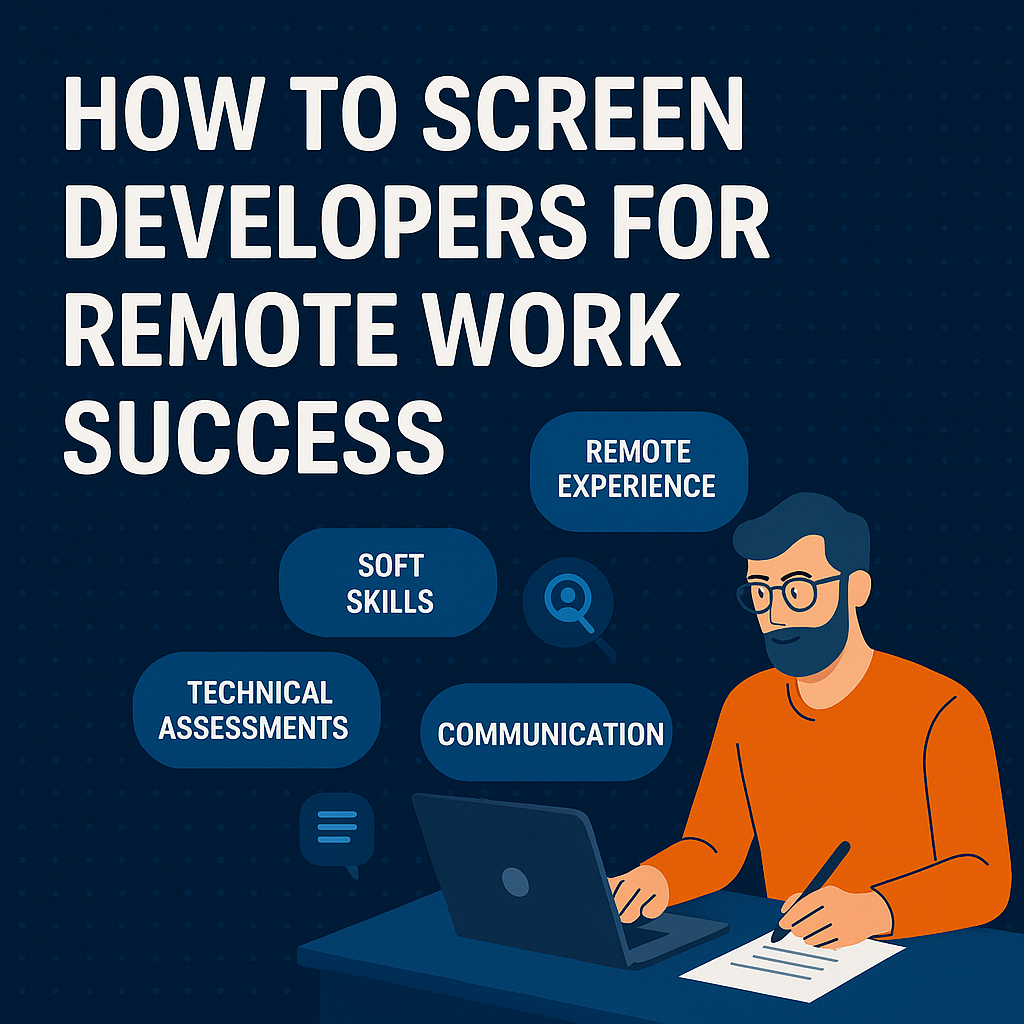In today’s rapidly evolving digital economy, remote software development has become the norm rather than the exception. However, hiring remote developers requires more than just evaluating technical skills — it demands a structured approach to assess communication, accountability, time management, and adaptability.
So, how do you screen developers effectively for remote work success?
Here’s a comprehensive guide from Belirise, a trusted technical recruitment company that helps fast-scaling tech companies find and retain top-tier remote developers.
Why Screening for Remote Readiness Is Critical
Remote developers often work independently, across different time zones and without direct supervision. This autonomy can accelerate productivity — if you hire the right people. However, if you don’t properly vet candidates for soft skills and remote compatibility, the risk of poor performance, miscommunication, or cultural misfit increases.
Belirise emphasizes a holistic approach when sourcing candidates, going beyond code tests to evaluate a developer’s remote work potential. Their pre-screening framework ensures clients only receive candidates who are technically brilliant and operationally reliable.
1. Start with Role-Specific Remote Job Descriptions
A detailed and remote-centric job description sets the foundation. Outline the technical stack, working hours, collaboration tools, expected communication rhythms, and performance metrics.
Use trending keywords like remote software jobs and developer onboarding to help your listings rank better in search engines.
Belirise assists employers in crafting job descriptions that attract highly relevant and remote-ready talent.
2. Evaluate Remote Experience Early
Don’t wait until the interview to ask about remote experience. Use application forms to ask:
-
Have you worked in a distributed team before?
-
What time zones have you worked in?
-
Which communication and project management tools do you use?
This allows Belirise to pre-filter candidates who already understand the dynamics of remote collaboration.
3. Use Asynchronous Technical Assessments
To simulate real-world scenarios, use asynchronous code challenges or take-home projects. This tests time management, problem-solving, and communication clarity.
Platforms like HackerRank or Codility are popular, but Belirise takes it a step further by customizing coding challenges to fit the client’s actual tech stack and remote workflows.
You’ll also want to screen for skills in full-stack development and cloud infrastructure, both vital for modern distributed engineering.
4. Assess Soft Skills with Behavior-Based Interviews
Technical skills are essential, but so is the ability to communicate clearly in a remote environment. During interviews, ask:
-
Tell us about a time you handled a project conflict remotely.
-
How do you manage overlapping deadlines across time zones?
-
What’s your approach to giving/receiving feedback online?
Belirise includes soft skill evaluations as a standard part of its developer screening process, helping you identify emotionally intelligent and culturally aligned hires.
5. Look for Proficiency in Remote Tools
Developers must be proficient in tools such as:
-
Slack or Microsoft Teams (for communication)
-
Jira, Trello, or Asana (for project management)
-
GitHub or Bitbucket (for version control)
-
Notion or Confluence (for documentation)
Ask candidates which tools they’ve used and how they’ve leveraged them in real remote projects.
You can also explore tool-specific skills via DevOps recruitment or collaboration technology roles as part of your search.
6. Test Communication via Written Assignments
Remote communication is largely written. Use async communication tasks to evaluate:
-
Clarity of messaging
-
Attention to detail
-
Ability to summarize complex information
Belirise integrates written assessments and asks candidates to communicate deliverables, project ideas, or task summaries as part of their evaluation process.
This ensures your future hires don’t just code — they communicate.
7. Analyze Their GitHub or Portfolio
A candidate’s GitHub is their online résumé. Look for:
-
Frequency of commits
-
Open source contributions
-
Documentation quality
-
Breadth of technologies used
Pair this with an analysis of their tech portfolio to gain insights into work quality and structure.
Belirise uses these metrics to validate both code quality and the developer’s ability to work independently on meaningful projects.
8. Trial Projects and Contract-to-Hire Models
Still unsure? Consider hiring developers on a trial basis. Many remote developers are open to a paid trial project, especially when expectations are clearly defined.
Belirise facilitates contract-to-hire arrangements, giving clients the flexibility to evaluate real-world performance before committing long-term.
Explore options under trending hiring models like contract tech roles and freelance developer recruitment.
9. Involve Your Engineering Team
Remote developers don’t work in silos. They need to fit into your existing team dynamics.
Invite your team leads or peers to conduct peer interviews or live code reviews during the process. Belirise can coordinate multi-round interview schedules and ensure every candidate is vetted technically and culturally.
10. Reference Checks and Cultural Alignment
Don’t skip this. Speak to former employers or colleagues about:
-
Communication habits
-
Work ethic and reliability
-
Remote work adaptability
Belirise performs thorough reference checks, adding an extra layer of confidence to each hire.
They also screen for cultural alignment using frameworks that align with culture-fit hiring — essential for long-term remote success.
Final Thoughts
The success of your remote engineering team hinges on how well you screen and select candidates. It’s not just about finding someone who can code — it’s about hiring people who can thrive independently, communicate effectively, and integrate into your team from anywhere.
Partnering with a technical recruitment expert like Belirise ensures your process is not only streamlined but also tailored to identify high-performance remote developers.
With Belirise, you get:
-
Pre-vetted remote developers
-
Proven technical + soft skill assessments
-
Global talent access
-
Fast, flexible hiring options
-
Reduced hiring risk
Whether you’re scaling your dev team or transitioning to remote-first hiring, Belirise is your strategic partner in building a future-ready tech workforce.
Ready to Hire Remote Developers That Deliver?
Explore top-tier remote talent at Belirise today.

